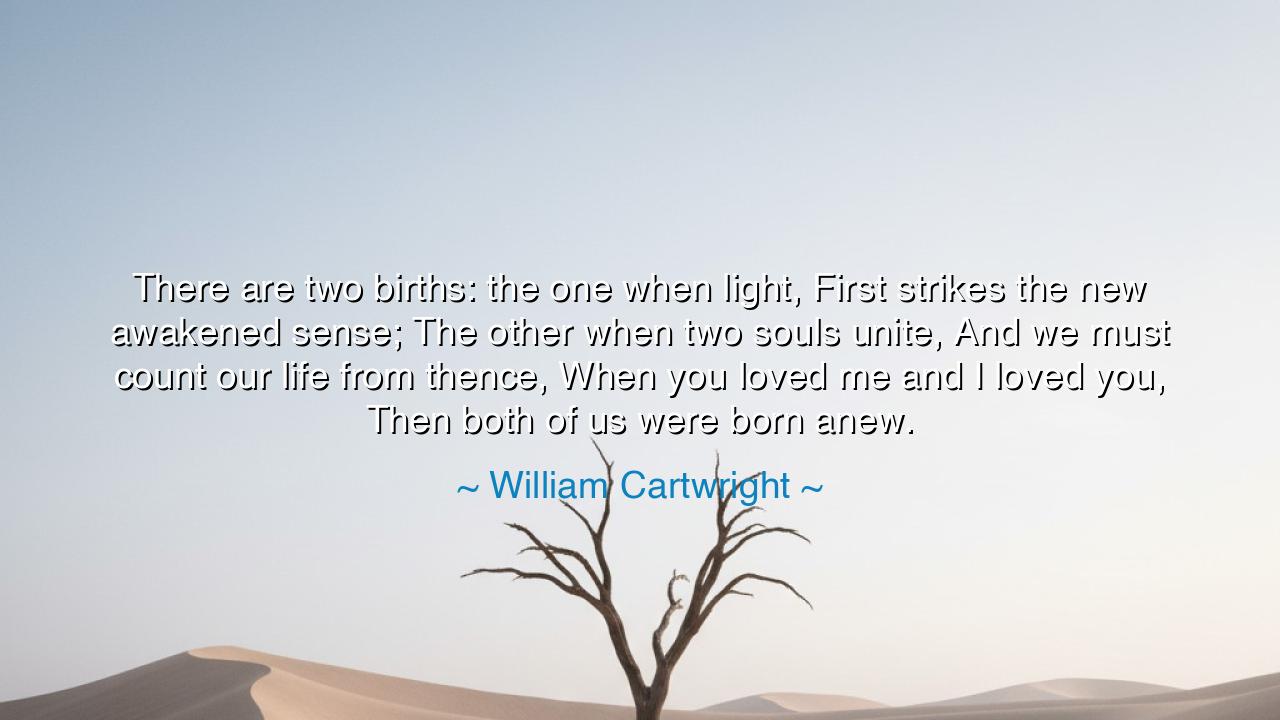
There are two births: the one when light, First strikes the new
There are two births: the one when light, First strikes the new awakened sense; The other when two souls unite, And we must count our life from thence, When you loved me and I loved you, Then both of us were born anew.






William Cartwright, poet of the seventeenth century, spoke with a voice that still resounds across the ages: “There are two births: the one when light, First strikes the new awakened sense; The other when two souls unite, And we must count our life from thence, When you loved me and I loved you, Then both of us were born anew.” In these lines, he unveils a mystery as ancient as creation: that man is not fully alive at his first cry, but only half-born until he has loved, and been loved in return. For birth brings us into the world of flesh, but love brings us into the world of spirit.
The origin of this truth is woven through the wisdom of every people. The ancients taught that the soul slumbers until awakened by another. The Greeks spoke of Zeus splitting man into halves, sending them into the world to wander until they found their missing part. The poets of Persia sang of love as a fire that refines the heart into gold. Cartwright, drawing from these streams, proclaims that the first birth gives us existence, but the second—when two souls unite—gives us true life. Without love, we may breathe, eat, and toil, yet remain but shadows of what we are meant to be.
Consider the story of Abelard and Heloise, whose love, though troubled and torn by fate, transformed their lives into something far beyond the ordinary. Their letters reveal the power of the “second birth”—that through their union of mind and soul, they felt themselves awakened, reborn, and forever changed. Though tragedy struck them, the love they shared outlived all wounds, immortalized in their words. So too does Cartwright’s verse declare that when one soul discovers another in the embrace of love, the ordinary passage of time is reset, and life begins anew.
The wisdom of this teaching is not confined to romance alone. Even in friendship, in deep bonds of loyalty and devotion, we see this truth unfold. When two companions meet and recognize each other in spirit, life changes its texture. A soldier who finds a brother in arms, a thinker who finds a kindred mind, a pilgrim who finds another traveler of the soul—all these experience the second birth, for they are lifted from solitude into shared existence.
Yet Cartwright speaks most deeply of love between hearts entwined, for this is the furnace where the soul is most tested and most transformed. When you are loved, your flaws are seen and yet embraced; when you love, you give beyond self, and in giving, discover your true self. The child’s birth gives the body to the earth, but love’s birth gives the soul to eternity. This is why he declares that “we must count our life from thence”—for what is life if it is unlived in love?
The lesson, O seekers of truth, is this: never despise the first birth, for it gives us the chance to live. But never neglect the second, for without it, life is but an empty span of days. Seek the union of souls—not only in romantic bonds, but in every act of true communion with another. Let love, friendship, and devotion awaken you again and again, until your days are filled not only with existence, but with life in its fullest measure.
Practical wisdom follows: open yourself to the possibility of love. Do not wall your heart in fear of hurt, for in sealing yourself against pain, you seal yourself against birth. When love comes, whether in the form of a companion, a friend, or a beloved, embrace it as the dawn of a new life. And once embraced, nurture it, for the second birth must be fed with care, patience, and devotion, lest it wither.
Thus Cartwright’s words endure, speaking not only of poetry, but of the destiny of the soul: that we are twice-born creatures, first into the light of day, and then into the light of love. And it is the second birth that crowns the first, so that when history asks who you were, the answer will not be in the years you lived, but in the moment you loved and were loved in return.






AAdministratorAdministrator
Welcome, honored guests. Please leave a comment, we will respond soon